A husky stops being a puppy at around 1 year old, but may still exhibit puppy-like behavior until 2 years old.
| Physical Maturity | 12-18 months |
| Social Maturity | 18-24 months |
| Considered Fully Grown | ~12 months |
| Behavioral Maturity | 2-3 years |
| Teething Period Ends | By 6-7 months |
| Best Training Period | 3-6 months (young puppy phase) |
| Size Assessment | Most accurate after 1 year |
| Spaying/Neutering Recommended | ≈6 months |
| Adult Coat Development | Begins around 6 months |
When does a husky stop being a puppy
During the first year of a Husky’s life, they undergo remarkable physical and behavioral changes. From birth to 12 months, a Husky experiences rapid growth, with their weight increasing significantly in a short period.
Additionally, this stage is marked by the teething process, during which they may exhibit chewing behavior as they alleviate the discomfort of emerging adult teeth. It is crucial to provide appropriate chew toys to support dental health and deter them from destructive chewing habits.
Furthermore, socialization plays a pivotal role in shaping a young Husky’s behavior and temperament. Exposure to various environments, people, and other animals during this critical period lays the foundation for a well-adjusted and sociable adult dog.
Proper socialization can help prevent potential behavioral issues that may arise when a Husky matures. This stage also sets the tone for obedience training, establishing boundaries, and instilling good manners that will benefit them throughout their lives.
Therefore, attentive care and positive reinforcement during the Husky’s first year contribute significantly to their overall development and behavior in adulthood..
Understanding the growth and development of your Husky is crucial for proper care, and an important aspect of this care involves addressing their hygiene needs. To learn how to keep your growing companion smelling fresh and clean, explore our comprehensive guide on effective Husky care tips.
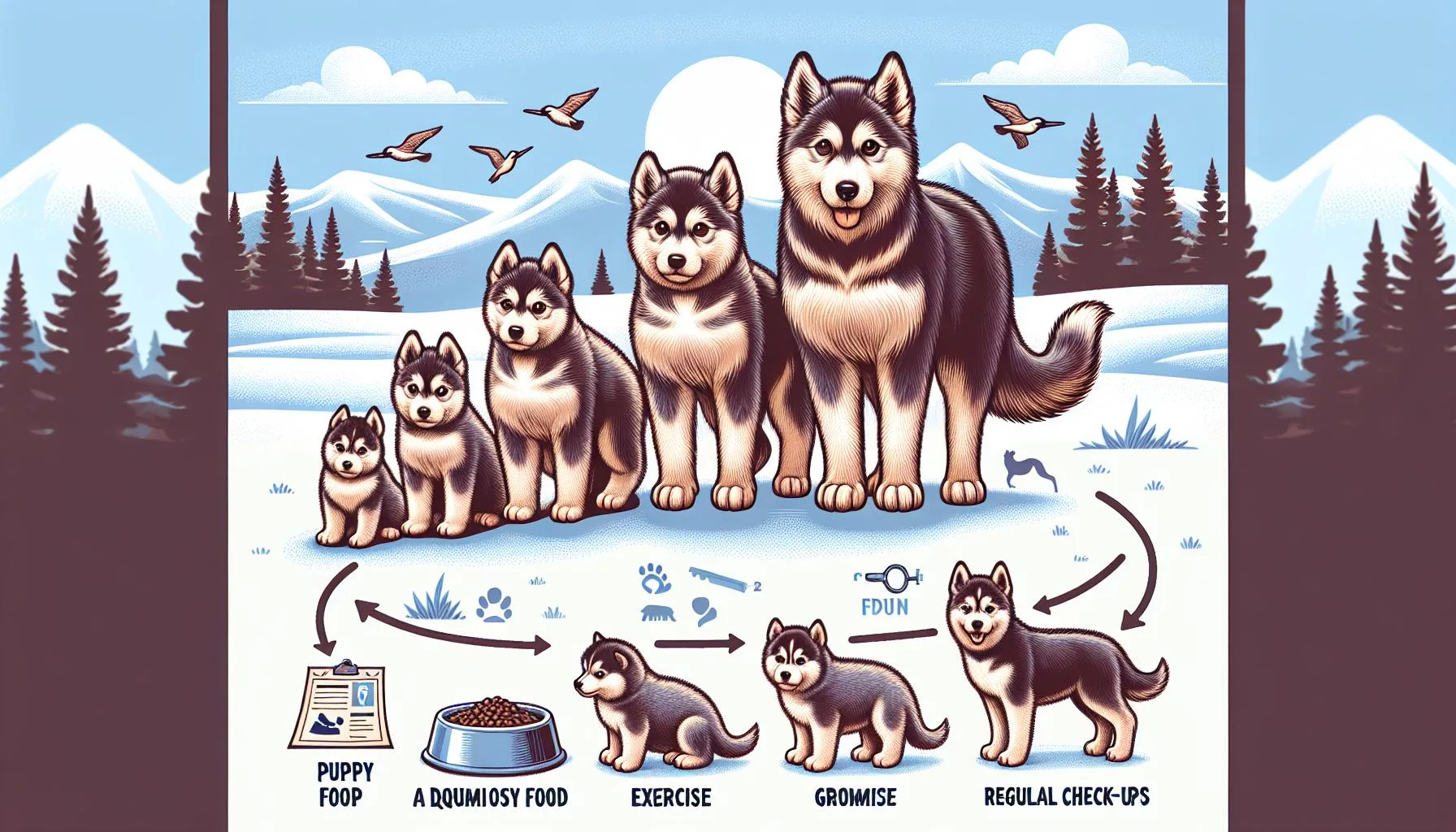
The Transition Period: 1 to 2 Years
During the transition period from 1 to 2 years of age, Huskies undergo significant physical and behavioral changes. Physically, they reach their full adult size and weight, with their skeletal and muscular development largely complete.
Their coat also undergoes a transition, becoming denser and more mature, requiring increased grooming attention.
When does a husky stop being a puppy
Behaviorally, there is a gradual shift from puppy-like exuberance to more mature behaviors. While some Huskies may retain certain puppy characteristics, such as high energy levels and playful demeanor, they generally display greater independence and can handle longer periods of alone time without becoming anxious.
Training and socialization efforts during this phase become crucial to reinforce desired behaviors and discourage any lingering puppy tendencies.
As these transitions in your Husky's life manifest, understanding the nuances of training and behavior management becomes paramount. Discover effective training techniques tailored for young Huskies by exploring "Training Your German Shepherd Husky Mix: A Step-by-Step Guide."
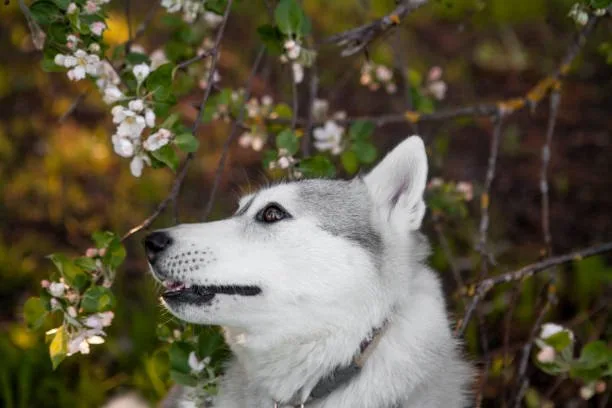
Caring for Your Husky's Nutritional Needs
As Huskies approach 1 year old, it is crucial to adjust their diet from high-calorie puppy food to a well-balanced adult dog food. This transition is important to support their changing nutritional needs as they mature.
When does a husky stop being a puppy? At around 1 year old, their growth rate decreases, and they require fewer calories to maintain a healthy weight.
When does a husky stop being a puppy
Transitioning to adult dog food ensures that they receive the appropriate balance of nutrients tailored to their adult maintenance needs. This includes a suitable protein level to support muscle development and maintenance.
Additionally, adult dog food may contain specific ingredients to support joint health and overall well-being as they transition to adulthood.
Ensuring your Husky transitions to the correct adult diet is crucial, but maintaining their emotional health is just as important. Discover practical strategies for alleviating stress in your companion with our guide on easing Husky anxiety.
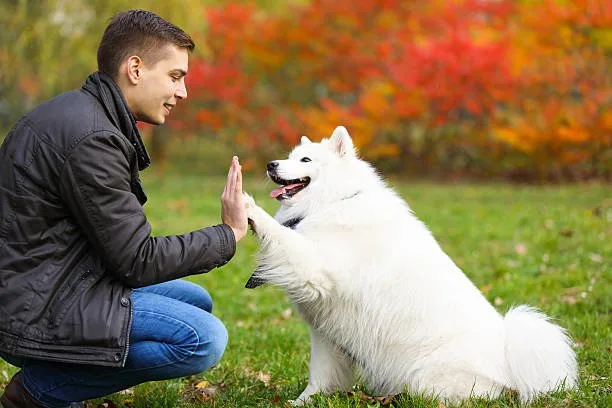
Physical Exercise and Training
As a Husky moves out of the puppy stage, their exercise needs and training methods evolve to accommodate their growing physical and mental capabilities. It’s essential to engage them in activities that align with their energy levels and athleticism.
Huskies are known for their high energy levels and endurance, so activities such as running, hiking, and agility training are beneficial for their physical development.
They thrive in environments where they can explore and engage in activities that stimulate their senses and provide mental and physical challenges.
Consistent training is crucial in channeling their intelligence and exuberance into positive behaviors. Obedience training, interactive play, and mental stimulation exercises help keep them mentally sharp and prevent boredom, which can lead to destructive behaviors.
It’s important to gradually increase the intensity and duration of their exercise as they mature, ensuring that they receive adequate physical activity to maintain their health and prevent obesity.
Additionally, incorporating variety in their exercise routine keeps them engaged and prevents monotony.
Overall, recognizing the shift in exercise needs and adapting training methods to suit their evolving capabilities is crucial for ensuring a healthy and well-rounded development as a Husky transitions out of the puppy stage.
For comprehensive insights on maintaining optimal health during your Husky's growth phase, delve into our detailed article on averting zinc deficiency, a common issue in these active canines. Discover the key nutritional strategies to ensure your Husky thrives by reading "Essential Nutrition to Combat Zinc Deficiency in Huskies."
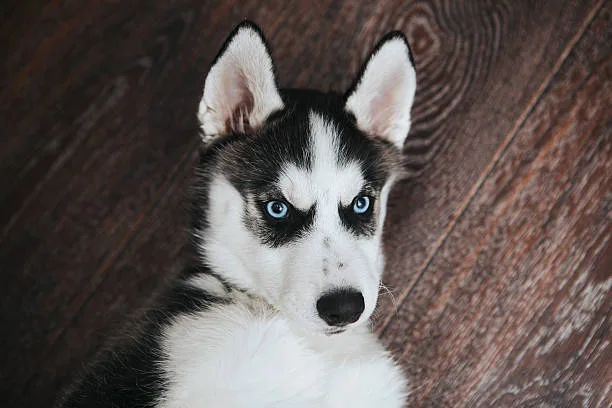
Health Care Considerations
As Huskies transition from puppies to adults, their health care needs evolve as well. Vaccination schedules play a crucial role in protecting your Husky’s health and should be tailored to their specific lifestyle and environment.
Spaying and neutering are important considerations, with the ideal timing depending on your Husky’s individual development and your plans for breeding. Additionally, regular veterinary check-ups become even more critical as your Husky matures, providing opportunities for preventive care, health assessments, and proactive management of any emerging health issues.
These check-ups also allow the vet to discuss dietary, exercise, and dental care needs tailored to your Husky’s adult life stage. When does a husky stop being a puppy, these are the key health care considerations to keep in mind to ensure their well-being as they grow.
Adhering to vaccination schedules tailored to your Husky’s lifestyle and environment is crucial for their health.
Timing for spaying or neutering should be carefully considered based on your Husky’s individual development and breeding plans.
Regular veterinary check-ups become increasingly important to address preventive care, health assessments, and proactive management of any emerging health issues.
These check-ups also provide opportunities for tailored discussions on dietary, exercise, and dental care needs as your Husky transitions into adulthood.
As your Husky matures and their health care needs evolve, ensuring their comfort during each life stage is just as important as the medical care they receive. Discover how choosing the optimal crate can provide a safe haven for your Siberian Husky, complementing their well-being with a cozy space of their own.

Mental Stimulation and Behavior
American Kennel Club: When does a husky stop being a puppy
Huskies are known for their intelligence and independent nature, which can sometimes translate into stubborn behaviors. To effectively manage this, it’s crucial to prioritize continued mental stimulation and consistent training as they transition from puppies to adults.
When does a husky stop being a puppy? Providing engaging activities like puzzle toys, interactive games, and regular training sessions not only helps to channel their mental energy but also strengthens the bond between you and your husky. Moreover, incorporating obedience training into their routine reinforces good behavior and develops their cognitive abilities, ultimately curbing any undesired traits.
By focusing on mental stimulation and training throughout their development, you can effectively address the intelligent and sometimes headstrong nature of huskies.
To ensure your Husky thrives, grasping the full extent of their needs is crucial. Dive deeper into effective care strategies for these dynamic dogs by exploring our comprehensive guide, Mastering Husky Care: Essential Insights and Tips.
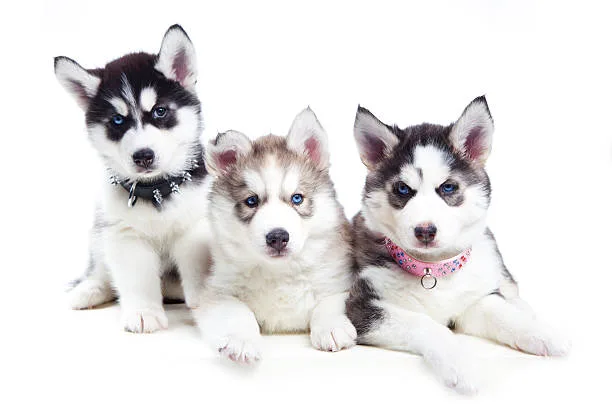
Understanding Adolescent Behavior
As Huskies transition from puppies to adolescents, they exhibit a range of behaviors that can pose challenges for pet owners. This period is characterized by increased independence as well as a tendency to test boundaries.
Adolescent Huskies may display stubbornness, defiance, and a heightened sense of curiosity as they explore their surroundings. It’s important to handle these behaviors in a firm yet compassionate manner, establishing consistent rules and boundaries while also providing positive reinforcement for good behavior.
Adolescence is a critical time for continued training and socialization to help Huskies mature into well-behaved adult dogs. During this phase, patience, understanding, and persistence are key in guiding Huskies through their transition to adulthood.
On Quora about: When does a husky stop being a puppy
Overall, understanding and addressing the challenges of adolescent behavior in Huskies is essential for fostering a strong bond and ensuring a harmonious relationship with these intelligent and spirited animals.
To ensure your Husky maintains optimal health while navigating through adolescence, understanding their ideal weight is crucial. Discover the healthy weight range for a Siberian Husky and gain insights into proper nutrition by visiting "Understanding Siberian Husky Weight Standards: A Guide to Your Dog's Health."
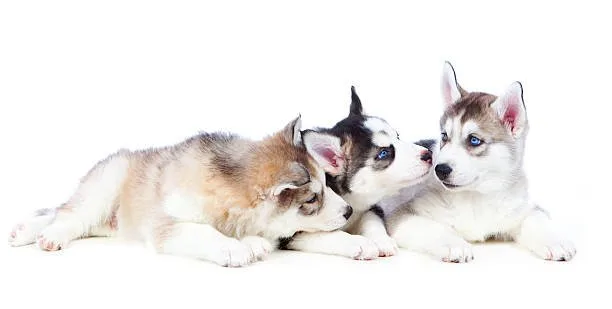
Recognizing When Your Husky Has Matured
Reddit When does a husky stop being a puppy
Recognizing when a husky has matured is essential for adapting care practices as they transition from puppyhood to adulthood. When does a husky stop being a puppy? One key indicator is their behavior – adult huskies tend to display more stability and self-control compared to their puppy selves.
They are less hyperactive and have a calmer demeanor. Their physical appearance also changes, with adult huskies reaching their full size and weight, and their coat becoming more lush and fully developed.
Another sign of maturity is their energy levels – adult huskies typically have a more consistent and moderate energy level compared to the unpredictable bursts of energy seen in puppies. By observing these behavioral, physical, and energy level cues, you can better understand when your husky has made the transition to adulthood.
As you adapt to your Husky's maturation, maintaining a tidy environment becomes equally important. Discover the optimal solution for managing your grown Husky's shedding by exploring our comprehensive guide to the most effective vacuums for Husky hair.
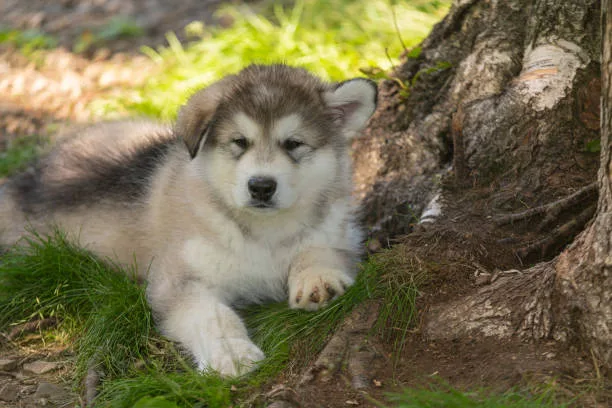
Assessing Physical and Behavioral Growth in Huskies
Husky growth stages are marked by distinct physical and behavioral changes that indicate their transition from puppyhood to adulthood. During the first year, Huskies undergo rapid growth, with noticeable weight gain and development of adult coat characteristics.
As they approach maturity, around 1 to 2 years of age, their energy levels may stabilize, and they exhibit a more balanced temperament compared to their puppy stages. An important aspect to consider when assessing their transition to adulthood is the coat transition.
While Husky puppies have a soft, fluffy coat, adult Huskies develop their characteristic dense, double-layered coat. Observing these coat changes can serve as a visual cue for their transition.
Furthermore, tracking growth chart benchmarks, such as weight and height, can provide an indication of their physical development. This information, coupled with changes in behavior and energy, can help pet owners identify when their Husky has matured into an adult.
To ensure your Husky grows up healthy and strong, understanding their nutritional needs is just as essential as monitoring their physical development. Delve deeper into optimizing your furry friend's health by exploring the tailored dietary recommendations for Siberian Husky puppies at "Planet Husky's Guide to Husky Puppy Nutrition."
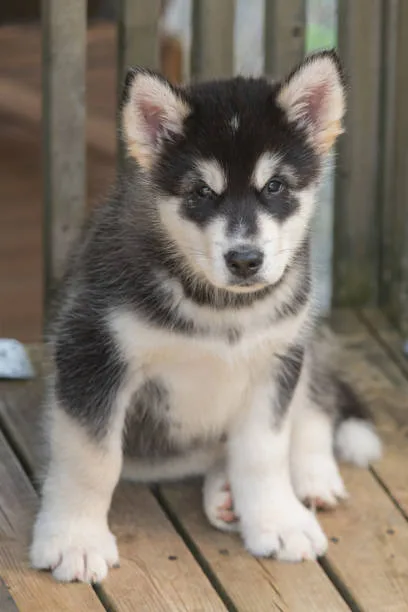
Optimizing Care for Husky Puppies and Adolescents
Proper care during the puppy and adolescent stages is crucial for the well-being of your Husky. Socialization plays a pivotal role during the formative months, shaping their behavior and response to various stimuli.
Introducing your puppy to different environments, people, and animals from an early age is essential for their development, helping them grow into well-adjusted adults. Additionally, crate training serves as a valuable tool in preventing separation anxiety, providing your Husky with a safe and secure space, even when you’re away.
As they transition into adolescents, obedience training becomes increasingly important. Teaching them basic commands and reinforcing positive behaviors lays a strong foundation for their future conduct.
Furthermore, addressing common challenges such as teething and chewing habits requires patience and consistent training. Lastly, early bonding is key to nurturing a trusting and affectionate relationship with your Husky, establishing a strong emotional connection that will endure as they mature into adulthood.
Understanding the unique needs of your Husky during these stages ensures a fulfilling and harmonious companionship.
Investing time in socializing your Husky from a young age sets the stage for positive interactions and a well-balanced temperament.
Introducing crate training early on can help alleviate any potential separation anxiety, providing your puppy with their own safe haven.
As your Husky becomes an adolescent, focusing on obedience training and addressing common challenges like teething is crucial for their development.
Early bonding and establishing trust with your Husky creates a strong foundation for a loving and enduring companionship.
For a comprehensive guide on nurturing your Husky through these critical stages, delve into our expertly crafted article. Moreover, understanding spinal issues in canines is vital for overall pet care, so explore our detailed piece on Intervertebral Disc Disease in French Bulldogs to enrich your knowledge on breed-specific health concerns.
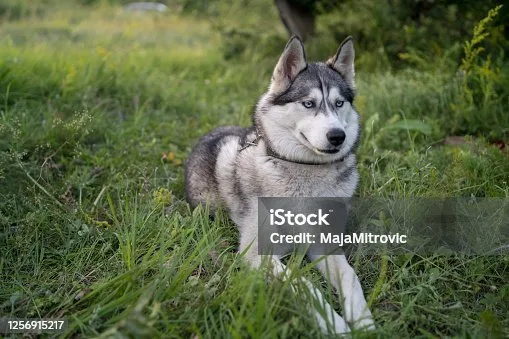
Nutritional Guidelines and Health Regimens
Huskies have specific nutritional needs that evolve as they transition from puppies to adults. When does a husky stop being a puppy, you may wonder? It’s essential to switch your husky from puppy food to adult dog food at the right time, usually around 12 months of age, to ensure they receive the appropriate balance of nutrients for their growth and development.
Additionally, it’s crucial to align your husky’s diet with their exercise level, especially during their younger years, to maintain optimal health and energy levels.
This may involve adjusting their food portions and considering their activity levels when determining their feeding schedule.
When it comes to the health regimens for huskies, it’s important to stay updated on vaccination schedules to protect them from common diseases and maintain their overall well-being. Furthermore, spaying or neutering your husky is a significant decision that can impact their long-term health, behavior, and population control.
Dental care is also an integral part of their overall health, so establishing a regular dental hygiene routine is essential to prevent dental issues.
By prioritizing preventive care, including regular veterinary check-ups and staying proactive about vaccinations and dental care, you can ensure that your husky remains healthy and thriving across different life stages.
For a deeper dive into the symbiotic relationship between humans and their four-legged companions, explore the extensive benefits that come from human-animal interactions. Discover the enriching impact of a pet’s presence by visiting the article on Health Benefits of Human-Animal Interactions.
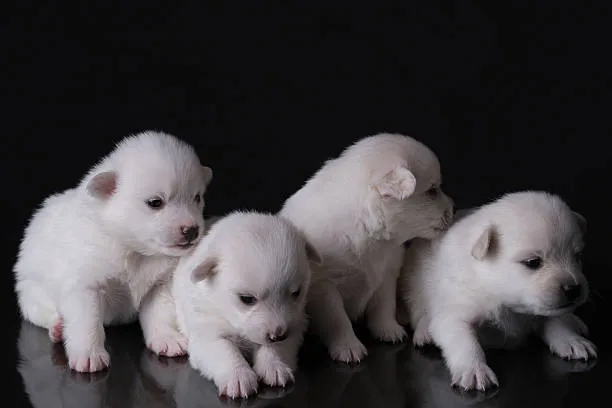
Maintaining Mental Well-Being and Apt Training Techniques
To ensure the mental well-being of your Husky and to address their changing behaviors as they transition from puppyhood to adulthood, it’s crucial to employ effective training techniques tailored to their age and temperament. Huskies are known for their intelligence and independent nature, so it’s essential to engage them in mentally stimulating activities to keep their minds active and prevent boredom.
This can include interactive puzzle toys, scent games, and obedience training to channel their energy in a positive way and prevent destructive behaviors. When does a husky stop being a puppy? Understanding that Huskies mature at different rates, it’s important to adjust training methods to suit their evolving needs and behaviors. Adolescence in Huskies can bring about increased independence and occasional testing of boundaries, so consistent and patient training is essential during this phase.
Active socialization with other dogs and people can also help in shaping their behavior and reducing any tendencies toward aggression or fearfulness. Additionally, recognizing the individual temperament of your Husky is crucial for implementing effective training. Some Huskies may be more stubborn, while others may be highly eager to please.
Tailoring training methods based on their unique personality traits can help in nurturing positive habits and curbing any undesired behaviors. Overall, maintaining the mental well-being of your Husky involves understanding their temperament, providing consistent mental stimulation, and employing age-specific training methods. By addressing their evolving needs and behaviors with appropriate training techniques, you can ensure the well-being of your Husky and foster a harmonious bond as they progress from puppyhood to adulthood..
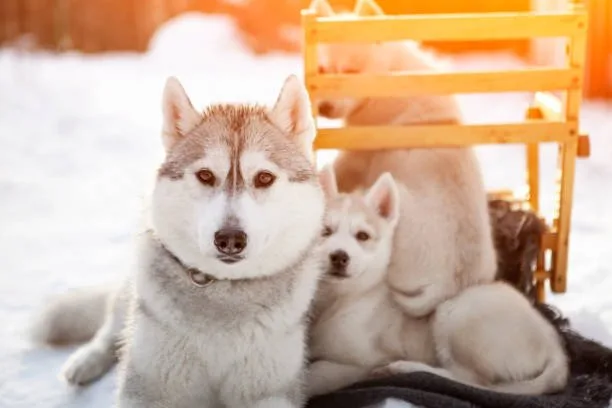
Comprehensive Grooming and Long-term Health Care
Adult Huskies require regular grooming to maintain their coat’s health and manage shedding. Grooming should include brushing at least twice a week to reduce loose hair and prevent matting, as well as occasional baths to keep the coat clean and minimize odors.
It’s essential to pay extra attention during seasonal changes when Huskies typically shed their undercoat, requiring more frequent brushing to remove loose fur.
Additionally, as a Husky transitions from puppy to adult, their dental care becomes crucial. Introducing regular tooth brushing and dental check-ups is essential to prevent periodontal disease and maintain overall health.
Providing chew toys and dental treats can also aid in keeping their teeth clean and strong.
Long-term health care for adult Huskies involves scheduling routine veterinary check-ups to monitor their well-being and detect any potential health issues. These check-ups should include vaccinations, parasite prevention, and discussions about nutrition and exercise requirements.
As Huskies age, it’s important to be vigilant for signs of aging, such as decreased energy levels, changes in appetite, or joint stiffness, and adjust their care practices accordingly to ensure their comfort and well-being.
Finally, preventive strategies such as regular exercise, a balanced diet, and mental stimulation play a crucial role in maintaining an adult Husky’s optimal health and hygiene. Engaging in physical activities like daily walks, hiking, and interactive play not only supports their physical health but also stimulates their mental well-being, reducing the likelihood of behavioral issues.
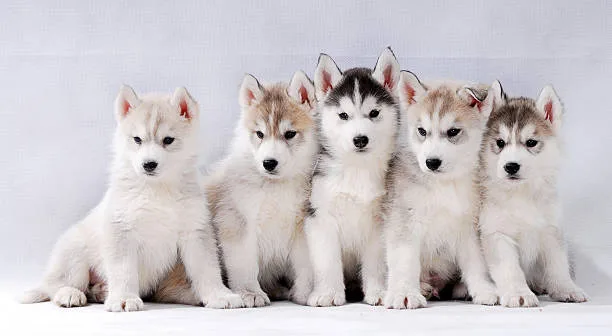
Conclusion: Embracing Your Husky's Growth
Congratulations on guiding your Husky through the journey from a lively puppy to a mature and graceful adult companion. It’s essential to recognize the evolving needs of your Husky as they transition into adulthood.
By adjusting care practices, such as nutrition, exercise, grooming, and healthcare, you ensure their well-being and contentment. Embrace this transformation by fostering a strong and fulfilling bond with your Husky, appreciating the unique qualities they bring to your life.
This journey is not just about their physical growth, but also about the beautiful companionship and mutual love that develops as they mature. Remember, as your Husky grows, your relationship deepens, creating a lasting and rewarding connection that enriches both your lives..

Leave a Reply